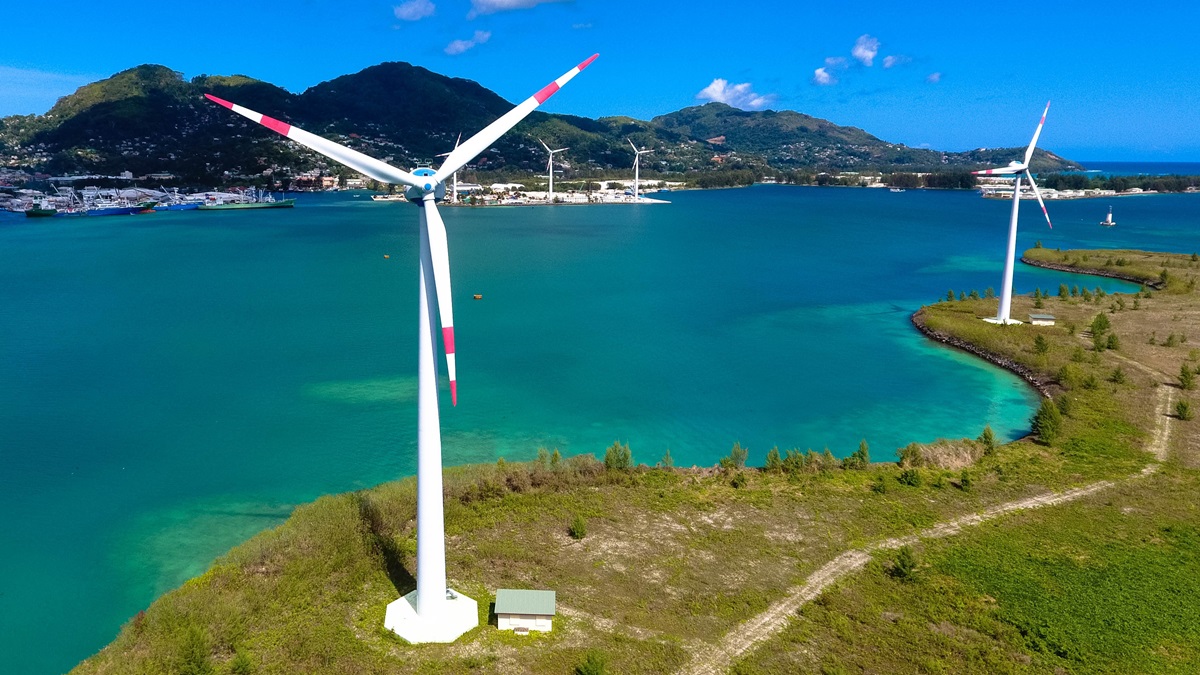New analysis unpacks how small island developing states are leveraging the ocean for climate action, calling for more global support to accelerate the momentum.
© Shutterstock/U. Eisenlohr | A wind power plant on Seychelles’ Mahe Island in the Indian Ocean off East Africa.
Oceans, which have absorbed 90% of the excess heat from greenhouse gas emissions over the past 50 years, are pivotal in the global fight against climate change. This is especially true for the world’s 39 small island developing states (SIDS), as oceans account for 70% of their biosphere.
In a new report published on the heels of the COP29 climate summit, UN Trade and Development (UNCTAD) dives into 606 ocean-related measures outlined by SIDS in their most recent national climate action plans, known as Nationally Determined Contributions (NDCs).
Under the Paris Agreement, countries update their NDCs every five years with the UN Framework Convention on Climate Change. So far, there have been two rounds of NDC submissions. The next is due by early 2025.
“Given the high dependence and close relationship of SIDS and the oceans, strategies to harness sustainable marine ecosystems for their environmental and economic stability will prove crucial to the success of future NDCs,” says David Vivas Eugui, who leads UN Trade and Development’s work on oceans and the circular economy.
Balancing ocean conversation and development needs
The report finds that 36 out of 39 SIDS have at least one ocean-related measure in their current NDCs.
Of the 606 measures analysed, over half (328) relate to sustainably using the ocean for economic development, while 278 focus on marine and coastal conservation. Most conservation measures concern area-based management (121 measures) or ecosystem protection, expansion and restoration (101 measures).
Marine and coastal tourism (92 measures) and fisheries (85 measures) – economic lifelines for many SIDS – are the most targeted sectors of the oceans economy.
Ocean for climate action: Strong focus on adaption
Adaptation features prominently in ocean-related climate action taken by SIDS, with 77% of measures overwhelmingly focused on addressing the immediate effects of climate change and building long-term resilience through their infrastructure and economic systems.
The remaining 23% target climate change mitigation primarily in shipping, energy and port activities, reflecting SIDS’ minimal contribution (under 1%) to global CO2 emissions.
Trade’s potential largely untapped
Despite SIDS’ exports of ocean-based goods and services reaching a record of $160 billion in 2022 and representing about 16% of their GDP, the role of trade remains marginal in their ocean-related climate action.
Overall, just 37% of ocean economy measures include a direct (7%) or indirect (30%) reference to trade, while ocean conservation measures make no mention of trade.
Need for more international support
UN Trade and Development’s analysis also shows that 64% of SIDS’ ocean-related NDCs depend on external support.
To implement their climate commitments, SIDS will require sustained help from the international community, including financial assistance, technology transfer, infrastructure upgrade and technical expertise.
A better way forward: Policy recommendations
First, the report underscores the need to improve SIDS’ ocean-related NDCs, as well as other ocean and coastal countries.
“In light of the next NDC submissions coming in 2025, tailor-made, comprehensive, measurable, actionable and enforceable commitments could enhance investment in the ocean-related sectors,” says Chantal Line Carpentier, head of UN Trade and Development’s trade, environment, climate change and sustainable development branch.
Second, the report calls for further harnessing trade, focusing on its contribution to the oceans economy while promoting sustainable use and conservation through innovative market-based solutions.
UN Trade and Development’s sustainable ocean-based economies classification and ocean trade dataset can help foster evidence-based policymaking in SIDS and beyond.
Additionally, stronger global partnerships and international cooperation mechanisms will remain crucial to mobilizing much-needed resources, enabling SIDS to effectively implement their NDCs towards sustainable development and climate resilience.
Efforts in this direction – such as upholding ocean-related official development assistance commitments or increasing support for UN Trade and Development’s climate trust fund and its oceans economy and fisheries programme – can help SIDS better design and execute more precise ocean economy targets for climate action, particularly related to conditional measures.

